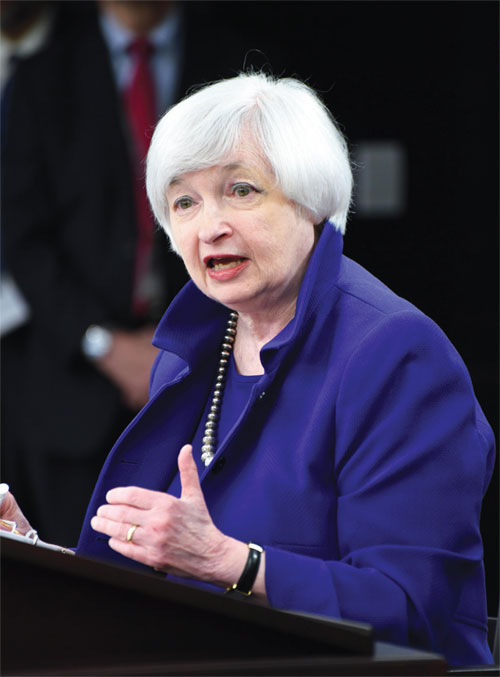

 |
| Federal Reserve Chair Janet Yellen at a news conference in Washington Wednesday said that a decision to raise rates by 0.25 percent reflected the Fed's "confidence in the US economy." [Zhang Weiran for China Daily] |
The US Federal Reserve's increase in its key borrowing rate - which had been kept at near zero for seven years - will likely mean more capital outflows from China and a depreciating yuan, according to analysts.
As expected, the Fed on Wednesday increased the federal funds rate which is used to set terms for many loans and savings products in the US by 25 basis points to 0.25 percent-to-0.5 percent, up from zero to 0.25 percent. The policy makers voted unanimously to raise the target range at the conclusion of their two-day policy meeting. The new rate was announced exactly seven years after the central bank cut rates to nearly zero on Dec 16, 2008.
Sung Won Sohn, a professor of economics at California State University Channel Islands in Camarillo, California, said the Fed's action will run counter to what the People's Bank of China (PBOC) desires. China's economy has been slowing and China's central bank has been trying to boost economic growth by lowering interest rates and cutting reserve requirements.
"Higher interest rates by the US central bank will cause further capital outflow and weaken the yuan. In order to stem the capital outflow and defend the currency, the PBOC would have to raise the interest rate, which is contrary to its objectives. In order to provide stimulus to the economy, the government would have to lower the interest rate and allow the yuan to depreciate," he wrote in an e-mail.
The US central bank expects "gradual" increases in coming months allowing it to gauge the impact of small increases on the economy and financial markets, noted Sohn.
Last week, China altered how it measures the value of the yuan by moving from an exchange rate that relied on the US dollar to the currencies of its trading partners. The new trade-weighted yuan exchange-rate index measures the yuan's strength relative to a basket of 13 foreign currencies, including the dollar, the euro and the Japanese yen, according to the trade volume with China.
By allowing the yuan to fluctuate against the basket of currencies instead of the US dollar alone, the PBOC has greater flexibility in dealing with the aftermath of a hike in the federal funds rate, said Tailan Chi, a professor at the University of Kansas business school in Lawrence, Kansas.
Fed rate rise likely to produce capital outflows
"The value of the dollar is likely to rise against other currencies in the basket as the federal funds rate is raised. The PBOC can then let the yuan fall against the dollar and thus make it more costly for Chinese investors to move their money to dollar-denominated assets to benefit from the higher interest rates. This enables them to maintain their current monetary policy and to claim that they are keeping the value of the yuan stable against the basket of currencies," Chi wrote in an e-mail.
"While the weight of the currencies in the basket has not been made public, I expect that the yuan will not follow closely further dollar appreciation, if that is the trend in global foreign exchange markets. But with global scrutiny on China the new normal, People's Bank officials and the Chinese government more broadly cannot afford to reduce their focus on strengthening domestic demand in China, particularly consumption, in order to achieve a longer term sounder basis for sustaining growth and development," Meg Lundsager, public policy fellow at the Wilson Center and a former US executive director at the International Monetary Fund, said in an e-mail.
The Fed's decision will reverberate around the world. Higher US interest rates will produce a stronger dollar that may attract capital from China and other emerging markets seeking higher returns. The Fed passed on raising rates in September in part because financial markets were rattled after the PBOC enabled the yuan to depreciate in August.
 Are these the world’s scariest landing strips?
Are these the world’s scariest landing strips? In pics: Left behind children in China
In pics: Left behind children in China Eight modern day engineering marvels of China
Eight modern day engineering marvels of China Chinese beauty with sexiest bottom
Chinese beauty with sexiest bottom Charming female bodybuilders of Chengdu University
Charming female bodybuilders of Chengdu University Polish sports stars strip off for risqué calendar
Polish sports stars strip off for risqué calendar Spectacular aerial photos of the Three Gorges
Spectacular aerial photos of the Three Gorges Contestants of Mrs. Globe pose for photo in Shenzhen
Contestants of Mrs. Globe pose for photo in Shenzhen
 Bikini models attend hot pot banquet in Hefei
Bikini models attend hot pot banquet in Hefei Top 20 hottest women in the world in 2014
Top 20 hottest women in the world in 2014 Top 10 hardest languages to learn
Top 10 hardest languages to learn 10 Chinese female stars with most beautiful faces
10 Chinese female stars with most beautiful faces China’s Top 10 Unique Bridges, Highways and Roads
China’s Top 10 Unique Bridges, Highways and Roads Smog induced anxiety
Smog induced anxiety Destined for greatness
Destined for greatness Obama made in China
Obama made in China Wuzhen showcases China’s Net prosperity
Wuzhen showcases China’s Net prosperityDay|Week